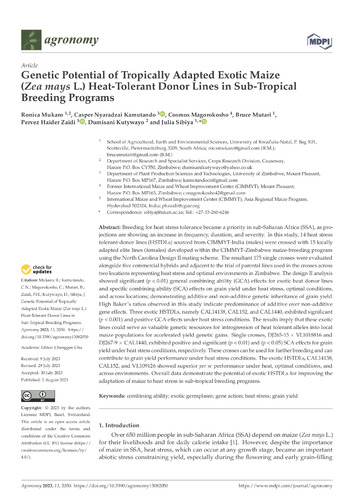Genetic potential of tropically adapted exotic maize (Zea mays L.) heat-tolerant donor lines in sub-tropical breeding programs
Abstract
Breeding for heat stress tolerance became a priority in sub-Saharan Africa (SSA), as projections are showing an increase in frequency, duration, and severity. In this study, 14 heat stress tolerant-donor lines (HSTDLs) sourced from CIMMYT-India (males) were crossed with 15 locally adapted elite lines (females) developed within the CIMMYT-Zimbabwe maize-breeding program using the North Carolina Design II mating scheme. The resultant 175 single crosses were evaluated alongside five commercial hybrids and adjacent to the trial of parental lines used in the crosses across two locations representing heat stress and optimal environments in Zimbabwe. The design II analysis showed significant (p < 0.01) general combining ability (GCA) effects for exotic heat donor lines and specific combining ability (SCA) effects on grain yield under heat stress, optimal conditions, and across locations; demonstrating additive and non-additive genetic inheritance of grain yield. High Baker’s ratios observed in this study indicate predominance of additive over non-additive gene effects. Three exotic HSTDLs, namely CAL14138, CAL152, and CAL1440, exhibited significant (p < 0.001) and positive GCA effects under heat stress conditions. The results imply that these exotic lines could serve as valuable genetic resources for introgression of heat tolerant alleles into local maize populations for accelerated yield genetic gains. Single crosses, DJ265-15 × VL1018816 and DJ267-9 × CAL1440, exhibited positive and significant (p < 0.01) and (p < 0.05) SCA effects for grain yield under heat stress conditions, respectively. These crosses can be used for further breeding and can contribute to grain yield performance under heat stress conditions. The exotic HSTDLs, CAL14138, CAL152, and VL109126 showed superior per se performance under heat, optimal conditions, and across environments. Overall data demonstrate the potential of exotic HSTDLs for improving the adaptation of maize to heat stress in sub-tropical breeding programs.

